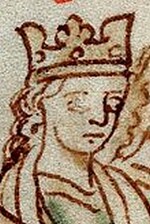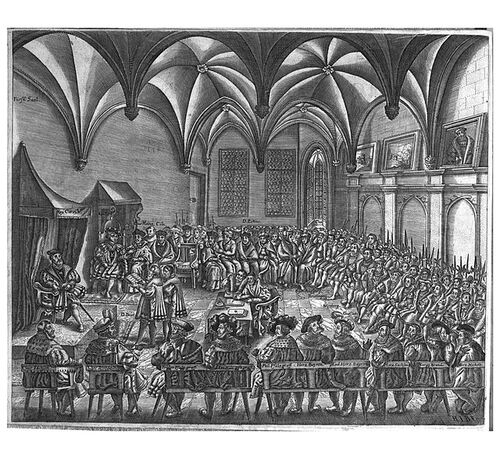-
Today in Tudor History...
25 June 1242 – Birth of Beatrice of England.
Beatrice of England also known as Beatrice de Dreux, was a Princess of England as the daughter of King Henry III of England and Eleanor of Provence. Her siblings were Edward I of England, Margaret, Queen of Scotland, Edmund Crouchback, 1st Earl of Lancaster, Richard of England, John of England, Katherine of England, William of England, and Henry of England. She and her family were members of the Royal house of Plantagenet, which first ruled in the 12th century and was founded by Henry II of England.

1291 –Death of Eleanor of Provence
She was Queen consort of England, as the spouse of King Henry III of England, from 1236 until his death in 1272.Although she was completely devoted to her husband, and staunchly defended him against the rebel Simon de Montfort, 6th Earl of Leicester, she was very much hated by the Londoners. This was because she had brought a large number of relatives with her to England in her retinue; these were known as "the Savoyards", and they were given influential positions in the government and realm. On one occasion, Eleanor's barge was attacked by angry citizens who pelted her with stones, mud, pieces of paving, rotten eggs and vegetables.
Eleanor was the mother of five children including the future King Edward I of England. She also was renowned for her cleverness, skill at writing poetry, and as a leader of fashion.

1373 – Birth of Joanna II of Naples
She was Queen of Naples from 1414 to her death, upon which the senior Angevin line of Naples became extinct. As a mere formality, she used the title of Queen of Jerusalem, Sicily, and Hungary.
Joanna was the daughter of Charles III of Naples and Margaret of Durazzo. In 1414, she succeeded her brother Ladislaus to the throne of Naples; at that date she was 41 years old and was already the widow of her cousin Hedwig's rejected fiancé, William, Duke of Austria. She married twice, but had no children.
1483 – Execution of Anthony Woodville, 2nd Earl Rivers.He was an English nobleman, courtier, and writer. He was the brother of Elizabeth Woodville,queen consort of King Edward IV After Edward's death he was arrested and then executed by Richard, Duke of Gloucester as part of a power-struggle between Richard and the Woodvilles.

1503 - Catherine of Aragon and Prince Henry were formally betrothed and a papal dispensation for the alliance was obtained.

1529 - Catherine of Aragon was found in contempt of the court of Blackfriars for not attending

Campeggio to Salviati
Yesterday I wrote all that occurred to me. This morning I caused myself to be borne to the place where we sit in judgment, as we had to take the King's oath today respecting the propositions and articles. We found him there in an adjoining chamber. After the ceremony had been completed, the King delivered to me a packet from the legate (Salviati) in France, of the 18th inst., enclosing your letter of the 3rd. I communicated its contents to the King. With regard to his affairs his Majesty says no more about past proceedings than I have written. He tells me he has written to his ambassadors, that although it was in the Pope's power to have done something for him, he rests satisfied, provided his Holiness do nothing against him in this citation. He has showed me a letter from his ambassadors, of the 7th inst., relating the arguments used by them to persuade the Pope not to exasperate the mind of his Majesty, and stating that he will do nothing whatever. They add in their letter that his Holiness has much faith in his Majesty, that he will not fail, in this negotiation for peace, to do what he has always done in favor and behalf of the Holy See. They bade the Pope to be of good cheer, as the King would not fail him, provided his Holiness did not interrupt this cause in any manner, which would exasperate the King's mind. They state that the Pope excused himself to them, saying they were to entertain no doubt on this head, as he would sooner suffer any thing, however terrible, in his own person.
On my recommending to his Majesty the interests of the Holy See and of the Pope, and inquiring if he would send any one to this conference, he hesitated for some time, and at length said he had not yet deliberated, but would send the Cardinal on the termination of this cause. I represented to him that it was impossible to terminate it in time. The King replied that as the French king had done so much for his Majesty, he would not refuse to postpone the negotiation for his sake. It seemed to me that he laid this down as a settled thing. He asserted that the congress of the Ladies would not take place on the 26th, as they wrote from France, but would be prorogued. He further told me that, in consequence of the declaration of war which he had sent to the Emperor, all their negotiations were broken off and at an end; and therefore it would not satisfy him to be named as a confederate by the French king in this peace, not even if he were comprehended with the former conditions, because it was inexpedient for them, least of all for the French king, as many of the conditions were adverse to him.
In fact, the King is evidently exerting himself to prevent the conference from arriving at any conclusion for the present, because he desires, first, to see the end of his cause, and then to send the Cardinal to conclude, at one and the same time, fresh articles with the Emperor and the universal peace. From all quarters I learn that lady Margaret warmly insists on this conference, and that the expectation of peace increases daily. I have had some suspicion that the Emperor and the French king were already in agreement, and a presentiment that this King and the Cardinal also had some doubts on this head; but now they seem to promise themselves much from the postponement of (the congress), and that it will not take place without an arrangement with the Emperor. In the course of conversation, York said to me, "Even were the French to act otherwise, we should still have the means of providing for ourselves, as there are ample mandates in Flanders to compound with us." As an argument for this postponement they urge that it will prevent the Emperor from entering Italy.
Pray, consider well in what travail I find myself,—not to speak of the sentence against the King, the Queen's contumacy, and their manner of proceeding. They conduct the trial in such a manner that it is impossible to act according to the evidence, in many cases, except after their fashion. London, 25 June 1529.
1530 – At the Diet of Augsburg the Augsburg Confession is presented to the Holy Roman Emperor by the Lutheran princes and Electors of Germany.
The Diet of Augsburg were the meetings of the Imperial Diet of the Holy Roman Empire in the German city of Augsburg. There were many such sessions, but the three meetings during the Reformation and the ensuing religious wars between the Roman Catholic emperor Charles V and the Protestant Schmalkaldic League in the early 16th century are especially noteworthy.
The session of 1530 attempted to calm rising tensions over Protestantism, especially due to fears of the rising Ottoman threat; the Ottomans under Suleiman had almost taken Vienna in 1529 and Charles V wanted Christianity to unite against this force. After the Edict of Worms had condemned Lutheranism, problems of enforcement emerged during the 1520s, as Charles V's wars against France and commitments in the rest of his empire prevented him from focusing on German religious problems. In 1529, however, he signed a successful peace treaty with France. After these successes, Charles aimed to assert his control over what he saw as German religious heresies It brought forth the Augsburg Confession, a central document of Lutheranism that was presented to emperor Charles V.
After his victory over the Schmalkaldic League, Charles V convened the Diet of 1547/48 (geharnischter Reichstag), where the Augsburg Interim was proclaimed. This attempt to give Catholicism the priority was rejected by many princes, though, and a resolution of the confessional tensions was only achieved at the session in 1555, where the Peace of Augsburg was concluded. The treaty acknowledged the Augsburg Confession and codified the cuius regio, eius religio principle, which gave each prince the power to decide the religion of his subjects.
The decrees of the Council of Trent were acknowledged in Italy, Portugal, Poland, and by the Catholic princes of Germany at the Diet of Augsburg held in 1566.

1533 - Death of Mary Tudor,Queen of France
Mary Tudor should be remembered as the Princess who defied her brother the King to marry the man that she loved
Erasmus said of her that "Nature never formed anything more beautiful."
She was the younger daughter of Henry VII of England and Elizabeth of York. She was married at 18 to the 52-year-old King of France, Louis XII. One of the Maids of Honour who attended her in France was Anne Boleyn. Mary was described by the Venetian Ambassador as "a Paradise—tall, slender, grey-eyed, possessing an extreme pallor". She wore her glorious silken red-gold hair flowing loose to her waist.When Louis died, Mary secretly married Henry VIII's friend, Charles Brandon, Duke of Suffolk.Mary's second marriage produced four children; and through her eldest daughter Frances, Mary was the maternal grandmother of Lady Jane Grey.
Mary died at Westhorpe, Suffolk, on 25 June 1533, and was first interred at Bury St Edmunds Abbey. Her body was moved to nearby St Mary's Church, when the abbey was destroyed during the Dissolution of the Monasteries.

1536-Anne Boleyn's Coronation.
Officers and noblemen with others who did service until the morrow after Midsummer Day, 25 Hen. VIII., according to the tenure of their lands and offices for the trial of their fees and profits.
The duke of Norfolk, marshal, by his deputy, lord William his brother, for that he himself was ambassador in France. The earl of Arundel, chief butler. The earl of Oxford, chief chamberlain. The earl of Shrewsbury, lord Talbot and Furnyval, did bear the sceptre and support the Queen's right arm, by the lord Talbot, his son, his deputy. The earl of Sussex, chief sewer. Viscount Lisle, chief panter. Lord of Burgavenny, chief larder. Lord Bray, for him and his coparceners, chief almoner. Sir Hen. Wyatt, chief ewer, supplied by his son Thos. Wyatt. Sir Giles Alington bare the first cup to the Queen. The canopy borne by 16 barons of the Cinque Ports. The Lord Mayor of London bare the cup at her void. The Mayor of Oxford kept the buttery bar. The duke of Suffolk, steward. The earl of Essex, carver. The earl of Derby, cupbearer, ex gratia.

1601 - Death of Peregrine Bertie, 13th Baron Willoughby de Eresby
He was the son of Catherine Willoughby, 12th Baroness Willoughby de Eresby, and Richard Bertie.Bertie was Lady Willoughby de Eresby's second husband, the first being Charles Brandon, Duke of Suffolk. Peregrine Bertie's half-brothers, Henry and Charles Brandon, died as teenagers four years before his birth. His sister Susan married the Earl of Kent and then the nephew of Bess of Hardwick. Owing to religious politics, the parents had to move outside England and the boy was born at Wesel on the River Rhine.

source:wikipedia,Encyclopedia Britannica, 11th Ed. Vol XVII. ,http://www.british-history.ac.uk/
